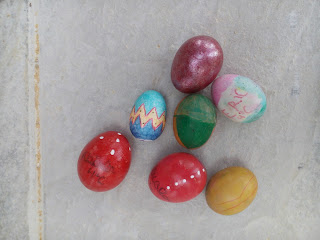An egg hunt is a game during which decorated eggs or Easter eggs are hidden for children to find. Real hard-boiled eggs, which are typically dyed or painted, artificial eggs made of plastic filled with chocolate or candies, or foil-wrapped egg-shaped chocolates of various sizes are hidden in various places. The game is often played outdoors, but can also be played indoors. The children typically collect the eggs in a basket. When the hunt is over, prizes may be given out for various achievements, such as the largest number of eggs collected, for the largest or smallest egg, for the most eggs of a specific color, consolation prizes or booby prizes. Real eggs may further be used in egg tapping contests. If eggs filled with confetti left from Mardi Gras (cascarones) are used, then an egg fight may follow. Eggs are placed with varying degree of concealment, to accommodate children of varying ages and development levels. In South German folk traditions it was customary to add extra obstacles to the game by placing them into hard-to reach places among nettles or thorns.
Easter eggs, also called Paschal eggs,are decorated eggs that are usually used as gifts on the occasion of Easter. As such, Easter eggs are common during the season of Eastertide (Easter season). The oldest tradition is to use dyed and painted chicken eggs, but a modern custom is to substitute chocolate eggs wrapped in colourful foil, hand-carved wooden eggs, or plastic eggs filled with confectionery such as chocolate. However, real eggs continue to be used in Eastern European tradition. Although eggs, in general, were a traditional symbol of fertility and rebirth, in Christianity, for the celebration of Eastertide, Easter eggs symbolize the empty tomb of Jesus, from which Jesus resurrected. In addition, one ancient tradition was the staining of Easter eggs with the colour red "in memory of the blood of Christ, shed as at that time of his crucifixion." This custom of the Easter egg can be traced to early Christians of Mesopotamia, and from there it spread into Russia and Siberia through the Orthodox Churches, and later into Europe through the Catholic and Protestant Churches.This Christian use of eggs may have been influenced by practices in "pre-dynastic period in Egypt, as well as amid the early cultures of Mesopotamia and Crete".
A number of companies have made use of the popularity of Easter and more specifically Easter egg hunts to promote the sales of their candy products. Most notable have been chocolatiers including Cadbury with their annual Easter Egg Trail. In 2015, the British chocolate company Thorntons worked with the geocaching community to hide chocolate eggs across the United Kingdom.
















No comments:
Post a Comment